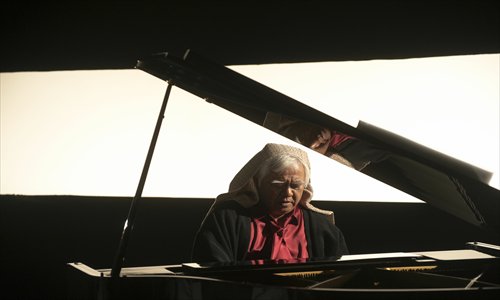The songs they are a-changin'
While performing on stage in 1976 in his native Taiwan, folk singer Lee Shuang-tze felt an urge to impart a sudden realization to his audience.
"In America we drink Coca Cola and listen to Western songs," he told the packed venue. "In Spain we drink Coca Cola and listen to Western songs. In the Philippines, we drink Coca Cola and listen to Western songs. And here in Taiwan, we still drink Coca Cola and listen to Western songs? Do we actually possess any of our own songs?"
To a rapturous response from the crowd, Lee then symbolically threw down an empty Coke bottle. This defiant gesture resonates on the island to this day, and the festival is still universally referred to as the "Coca-Cola event."
Indigenous heritage
The festival had been organized by Lee and other students at Tamkang University in New Taipei City and who were all great lovers and advocates of traditional Taiwanese folk songs.
And this outburst inspired a wider group of musicians to actively immerse themselves in the island's indigenous musical heritage and to kickstart what would become known as the Taiwan Folk Movement.
One of the pioneers of that movement and who was also on the bill that December day was Hu Te-fu (Kimbo Hu), an aboriginal singer from the Puyuma tribe from southern Taiwan and who was one of Lee's best friends. It was also a defining moment for Hu as he told the Global Times when we interviewed him last month.
Almost 40 years later, Hu is a white-haired senior citizen in his sixties. He was in Shanghai to promote his album Sky High Mountain Blues, which was released earlier this year. It may be only his second recording, but for the past 36 years Hu has never been tired of promoting Taiwanese folk music.
And he has written a wealth of songs which combine traditional indigenous arias from his own tribe with American Blues music.
Hu told the Global Times: "Since childhood, I have heard people in my tribe humming these arias while they were farming or taking part in religious ceremonies. These arias have all been passed down by word of mouth from our ancestors."
Hu admits that before that fateful day in 1976, he, like most of his peers, focused his musical passions solely on Western songs. "However," Hu said, "it was after the 'Coca Cola event,' that I began to realize that the arias I couldn't stop humming could also be performed formally on stage. And it wasn't just folk music that was affected by the subsequent movement. There was a revival of the whole indigenous culture of Taiwan."

Civil rights
Hu has also been active in promoting civil rights for various aboriginal tribes in Taiwan. He is even referred to as "Taiwan's Bob Dylan" because he has written so many songs highlighting the struggles and histories of these tribes.
In 1982 he became one of the founders of the Minority Affairs Council, and established the Alliance of Taiwan Aborigines two years later in the struggle to achieve equality for minorities. And with a group of aboriginal university students he also helped start the Northern Students Alliance to campaign on behalf of the 74 aboriginal miners killed in the 1984 Haishan mining disaster, and also against the construction of a nuclear waste dump on Orchid Island.
However, his busy social activism saw Hu neglect making and performing music for a number of years.
He didn't release his first album, In A Flash, until 2005 when he was already 55 years old. The record brought him both the Best Lyricist and Best Song of the Year awards at Taiwan's Golden Melody Awards in 2006.
Sky High Mountain Blues, meanwhile, was realized as the fruit of a long music trip to Nashville, Tennessee. There, Hu met up with blues and gospel singers who worked with him to record the album which features a mix of American rock, gospel and his own tribal arias.
Wang Xiaofeng, the Chinese music critic said of Hu: "this folk singer from a remote tribe in Taiwan has turned his career in a new direction at an advanced age. But his music still finds a common spiritual home among the island's different ethnicities."